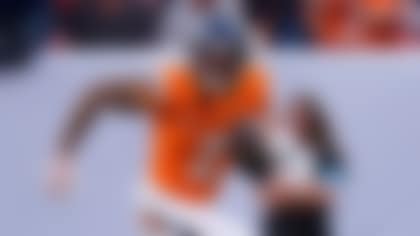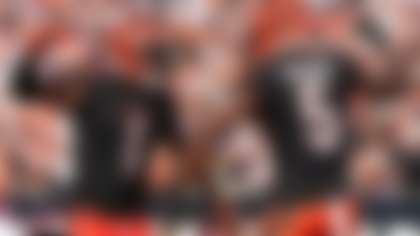Oakland rode high through much of the 2016 season -- but in the wild-card game against Houston, it all came crashing down.
An offense that was powered by gunslinger Derek Carr and leaned on a stellar offensive line looked like a shell of itself in the playoffs. Pro Bowl left tackle Donald Penn missed the first game of his career, and Carr was busy recovering from surgery to repair a broken fibula. The latter was an obvious loss, but the former's true value only became apparent in the postseason defeat.
It can be hard to quantify how effective an offensive lineman is. Outside of pancake blocks and recorded sacks, there aren't many metrics to statistically describe how a lineman is performing, so we often rely on reputation. Cleveland's Joe Thomas has long been the model left tackle in the league, serving as a moving wall for the Browns' myriad of quarterbacks. His collection of All Pro and Pro Bowl honors serve as the example of what it means to be a franchise left tackle.
But when keying on the Raiders' offensive line, Penn stands out, especially against the toughest competition. Against Denver in Week 17, Penn spent much of his afternoon matched up against All World linebacker Von Miller. He didn't wilt.
It's clear why Penn has only given up one -- albeit fateful -- sack this season: the man can neutralize any pass rusher in his path. Penn displayed good feet on almost every pass play, effectively pass dropping with the quickness to match Miller's speed off the edge, meeting him at a variety of depths and keeping him off the back of quarterbacks Matt McGloin and Connor Cook for most of the game. When Miller tried the speed rush and got half a step on Penn, the tackle got a piece of him while recovering to keep Miller on the outside, shielding McGloin and Cook all the way around the back of the pocket without losing his man.
There was only one instance in which Penn was significantly beaten, when Miller faked a speed rush and cut inside, catching Penn with a narrow base and knocking the tackle over. It didn't matter, though, as McGloin got the ball out before Miller could get within arm's reach.
That was how Oakland schemed its offense in the absence of Carr. Deeper plays originated out of the shotgun, and most pass calls were fast ones. Quick outs and short passes over the middle were called to simplify the passing game with lesser passers under center. It didn't help much, though, when facing a 24-point deficit in what turned out to be a blowout loss.
Penn's absence was noticeable almost from the start in the Wild Card round against Houston. While Denver loaded up on the right side of the line and left Miller to work against Penn, the Texans brought pressure from all over, which meant more defenders in the face of Cook.
Penn was effective on quick plays by cutting the legs of Miller on the edge, to both neutralize his rush and get his hands down in order to open a window for the quarterback to throw through to a receiver in the flats. Without Penn, the Raiders' first pass against Houston was foretelling of how the afternoon would go.
Matched up against Jadeveon Clowney, Penn replacement Menelik Watson tried to employ the same cut strategy. Clowney bounced off the block, staying upright to tip the pass, resulting in an incompletion.
Watson was effective against the bull rush, but when it came to any sort of angling, rip moves or speed rushes, he was below average. Watson continued to struggle against rushers named Clowney and others, allowing a sack after D.J. Reader beat him on a simple inside move. The difference in agility between Penn and Watson was evident for much of the game, none more than on this sack.
Oakland went from averaging 4.1 yards of separation allowed on the left side of the offensive line, to 3.1 yards in the Wild Card game. How much is a Pro Bowl left tackle worth? One full yard of separation (and in turn, protection and space to work), according to Next Gen Stats.
The pressure from Clowney was frequent, but as the heat map shows, it wasn't exclusive. Houston also found success with a rush on the opposite side of the line from Whitney Mercilus, who beat tackle Austin Howard on more than one occasion.
When combined, the pressure began to have an effect on Cook. The quarterback was errant on many short attempts, throwing the ball behind Seth Roberts on a slant, resulting in an incompletion, and forced deep passes into coverage. It was as if Cook decided to let it fly instead of stand in the pocket and get sacked before his receivers were able to get open, and became a game of throw it up and hope a Raider came down with it. It stifled the Raiders' offense, which never mounted much of a threat against Houston's defense.
The results are stunningly clear. Houston's added pressure from all sides frazzled Cook, who was ineffective. Penn's absence only made it more difficult for the quarterback, making his first professional start, to find any rhythm in the passing game. After looking at the heat map graphics, it's no wonder Cook struggled.
Oakland went out with merely a whimper, bringing a promising season to a very disappointing end. It reinforced the simple principles of football: the game is won and lost in the trenches, and the quarterback and backup quarterback (and Pro Bowl left tackle) are the two most important members of the organization.
Other notes from Wild Card Weekend in Next Gen Stats:
- Seahawks receiver Paul Richardson had the breakout game of his career against the Lions in the Wild Card game, thanks to a few circus catches. On all three of Richardson's catches, he had 1.2 yards of separation or less.
- Speaking of Seahawks, DeShawn Shead is the unheralded member of the current version of the Legion of Boom, but he was pretty effective against Detroit. Shead was targeted 10 times and allowed just one catch for 19 yards and an opposing passer rating of 39.6.
- Pittsburgh struck quickly against Miami last weekend, especially against the blitz, which had worked well for the Dolphins in their previous matchup but crashed and burned Sunday. Ben Roethlisberger completed 4 of 6 passes for 133 yards, two touchdowns and a passer rating of 143.5.
- Aaron Rodgers' 5-yard touchdown pass to Davante Adams came after Rodgers spent 8.4 seconds looking for an open man. It was Rodgers' second longest time to throw of the season (8.6 seconds against Detroit in Week 17), and the third longest time of the season for the entire league (Trevor Siemian took 9.2 seconds to throw on a 6-yard touchdown pass against Kansas City in Week 12).











